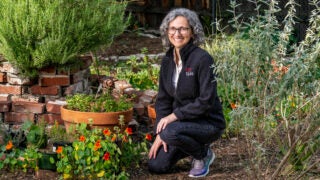
(Photo / Kirk Mckoy/Los Angeles Times Via Getty Images)
USC Immigration Expert on the Complex Ties Between Citizens and Noncitizens
An immigration law expert looks at the complex ties that connect citizens and noncitizens in America.
What happens to someone after they leave their homeland and arrive in America seeking a new start? Emily Ryo, a Carnegie Fellow and associate professor of law and sociology at the USC Gould School of Law, has spent more than a decade researching that question. In that time, U.S. immigration has become one of the most talked-about issues in the country.
“There are a lot of misperceptions out there about immigrants and immigrant communities, and that’s distorting our democracy,” Ryo says. “We’re at a moment where debates about immigration have become so polarized that it’s hard to find a middle ground.”
Meanwhile, many immigrants are being thrown into a complex legal process without any legal knowledge or help from lawyers, she says. Ryo talked with writer Ana Beatriz Cholo about the immigration process and its deep ripple effects throughout our country and abroad.
What is immigration from a legal perspective?
Unlawful status under current U.S. immigration law is changeable. This means that many noncitizens of today will be citizens of tomorrow. Immigration is not simply binary, because even within single families, different members have different legal status. They are what we call “mixed status families,” and they are very common. This fact also reminds us how interconnected the lives and fates are of citizens and noncitizens in our country.
Are all detainees undocumented immigrants?
No, many detainees are asylum-seekers who have arrived at our ports of entry and have lawfully surrendered themselves to U.S. Customs and Border Patrol to seek asylum. There are also a lot of lawful permanent residents, known as LPRs or green card holders, who get detained because they are placed into removal proceedings. As long as you are a non-citizen you are always at risk for detention and deportation.
Many LPRs grew up here and have children here but are being separated and deported because our laws have added an increasing number of crimes over time that can trigger a removal proceeding. It’s been some time that we have been on this path of criminalizing immigrants. There’s even a term for this: “crimmigration,” which refers to the convergence of criminal and immigration law.
Politicians have used this idea of immigrants as criminals for their own purposes. The convergence of immigration and criminal law is partly a result of this rhetoric, and so is the increasing prosecution of illegal entry and reentry. Illegal entry wasn’t always a criminal violation. But now people who have done nothing except enter the country without documentation face the possibility of misdemeanor charges, and if they enter again after being deported, they can face felony charges for illegal reentry.
Why should Americans care about immigration?
Some people may not live or work in areas where they have regular personal contacts with immigrants on a daily basis. But that doesn’t mean their lives are not being impacted by immigration. Take, for example, the American food system — from farms to grocery stores and restaurants, our system relies heavily on immigrant labor. If one cares at all about food (and everyone has to at some level), one has to care about who is doing the work that makes it possible for our food system to function.
The same is true for so many segments of our economy and the labor market, including the high-tech industry and the corporate world. Many Fortune 500 companies were founded by immigrants or children of immigrants. Millions of small businesses were founded by immigrant entrepreneurs. Immigrants are also a critical segment of the student body in our universities, which is why so many universities were among the first to protest the travel ban and the rescission of Deferred Action for Childhood Arrivals.
How did you first become interested in this field of law?
I immigrated to the United States when I was young, and to make ends meet, my mother held two full-time jobs. I grew up spending my weekends at my parents’ small general merchandise store in a predominantly black and Latino neighborhood in Chicago. Those experiences naturally shaped my early interests in poverty, inequality, law and immigration.
How do enforcement practices influence people’s views on our legal system?
My research documents at least three different ways in which immigrant detainees come to see our legal system as punitive, inaccessible and arbitrary.
First, because of the harsh conditions and the prolonged length of their confinement, immigrant detainees experience detention as punishment, although our government calls it “civil confinement.”
Second, many detainees also believe that our legal rules are made incomprehensible by design. This belief is likely shaped by the detainees’ experiences with institutional barriers that prevent them from obtaining legal knowledge, and their encounters with U.S. immigration officials whom the detainees report as being motivated largely, if not solely, by their desire to expedite the removal process.
Third, many detainees believe that their legal outcomes are arbitrary. They use words like “lottery” and “luck” to describe how one’s legal outcome depends solely on which immigration official or immigration judge happens to be assigned to one’s case.
What was the focus of your early U.S. immigration research?
In my earlier work on undocumented immigrants, I explored the complex moral values and social norms that enable otherwise law-abiding immigrants to violate U.S. immigration laws. For example, the need for work, the need to support their families. They talked about how their decisions to cross the border illegally were borne out of their inability in their home countries to live up to these deeply held values and commitments.
What are you studying now?
My current work focuses on various aspects of immigration detention in the United States. And I’m trying to answer questions like, what is our immigration system teaching our noncitizens and their families about the nature of our legal system and the rule of law? How are those lessons being diffused throughout our immigrant communities in the United States and abroad? What are the long-term consequences of that learning and diffusion process for our democracy?
In my current work with immigrant detainees, I have met many individuals who were thrown into removal proceedings and into detention without any knowledge of the legal process, and without the assistance of legal counsel. Navigating our complex immigration system — especially alone — is an extremely daunting task, to say the least. On top of that, detainees have to do this while separated from their families and communities. It’s not surprising then that many immigrants emerge from this process with a deep sense of distrust and cynicism toward our legal authorities and our legal system.



